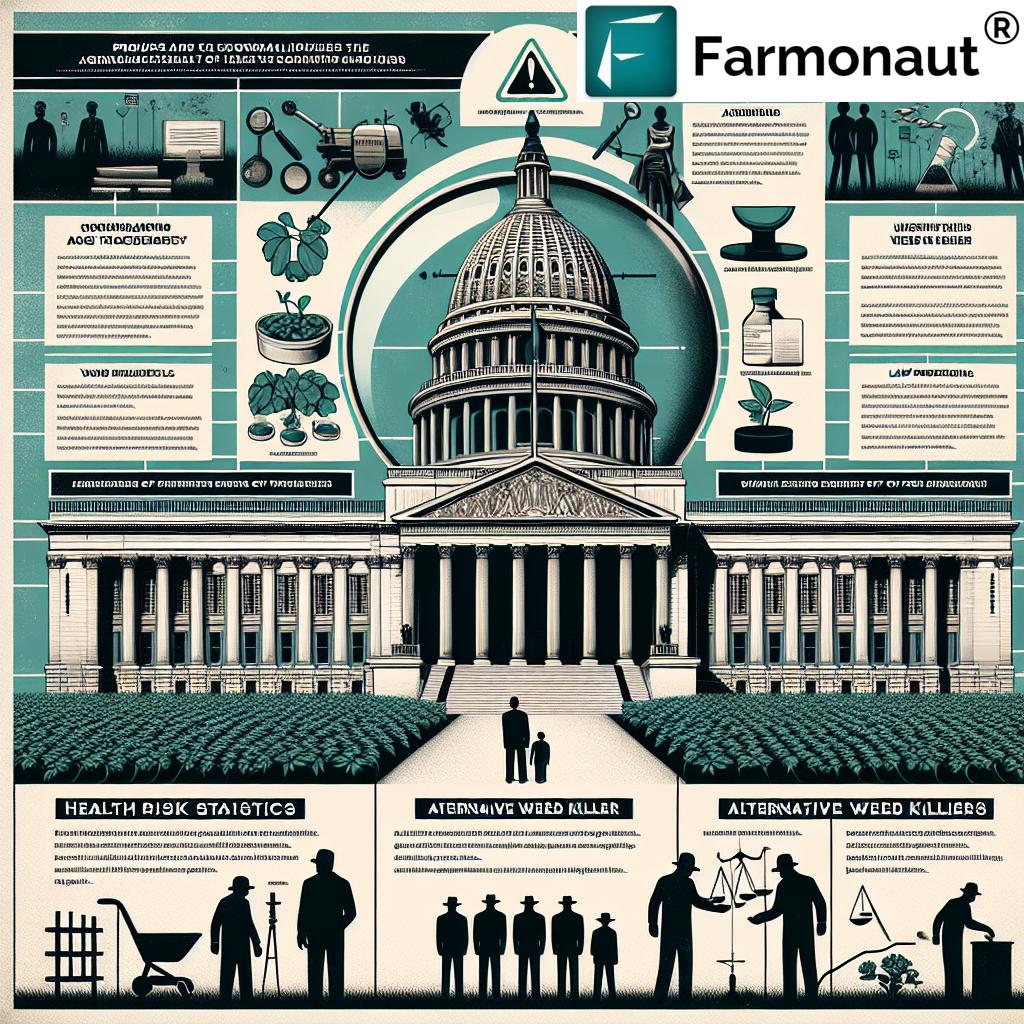The Future of Glyphosate: Navigating Legal Challenges and Agricultural Innovation in Missouri

“Over 125,000 Roundup cancer lawsuits have been filed against Bayer, the parent company of Monsanto, as of 2023.”
In the heart of America’s agricultural landscape, a storm is brewing. The future of glyphosate, the active ingredient in the popular weedkiller Roundup, hangs in the balance as legal challenges and health concerns collide with agricultural innovation. As we delve into this complex issue, we’ll explore the ongoing battle between federal and state pesticide regulations, with a focus on Missouri and its implications for farmers, consumers, and the broader agricultural industry.
The Glyphosate Dilemma: A Missouri Perspective
Jefferson City, Mo., finds itself at the epicenter of a nationwide debate that could reshape the future of American agriculture. The global agrochemical manufacturer Bayer, which acquired Monsanto in 2018, is facing an unprecedented legal challenge that has reached the steps of the U.S. Supreme Court. At stake is the question of whether federal law preempts thousands of state lawsuits alleging that Bayer failed to warn consumers about the potential cancer risks associated with its popular weedkiller, Roundup.
This legal battle is not just about one product or company; it’s a watershed moment that could redefine the relationship between federal and state pesticide regulations, with far-reaching consequences for agricultural chemical litigation across the nation.
The Missouri Case: A Catalyst for Change
- A St. Louis gardener was awarded $1.25 million after developing non-Hodgkin’s lymphoma
- The case highlights the tension between federally approved labels and state-level warning requirements
- Bayer argues that federal pesticide laws should preempt state failure-to-warn lawsuits
The case that has propelled this issue to the forefront involves a community gardener from St. Louis who was awarded $1.25 million after developing non-Hodgkin’s lymphoma. The plaintiff claimed that his cancer was caused by years of spraying Roundup, which contains glyphosate as its key ingredient. This case is particularly significant because it underscores the conflict between federally approved product labels and state-level requirements for warning consumers about potential health risks.
Bayer’s position is clear: they contend that federal pesticide laws should preempt states from adopting additional labeling requirements for products like Roundup. This stance, if upheld, would effectively prohibit failure-to-warn lawsuits brought under state laws. The implications of this argument extend far beyond Missouri’s borders, potentially affecting agricultural practices and consumer protection measures nationwide.
The Legal Landscape: A Patchwork of Decisions
As the legal battle unfolds, we’re seeing a complex patchwork of decisions across different jurisdictions:
- The 3rd U.S. Circuit Court of Appeals ruled in Bayer’s favor
- The 9th and 11th Circuits have ruled against Bayer’s position
- The U.S. Supreme Court previously declined to hear a similar case from California
This inconsistency in rulings across different circuits is precisely why Bayer is pushing for the Supreme Court to intervene. The company argues that without a definitive ruling from the highest court in the land, the future of American agriculture hangs in the balance.
“Glyphosate, the active ingredient in Roundup, is used on approximately 80% of genetically modified crops in the United States.”
The Stakes for Agriculture
The potential ramifications of this legal battle extend far beyond the courtroom. Bayer has stated that if the lawsuits persist, it might have to consider pulling glyphosate from U.S. agricultural markets entirely. This would be a seismic shift for the industry, given that glyphosate is currently used on approximately 80% of genetically modified crops in the United States.
Jess Christiansen, head of communications for Bayer’s crop science division, emphasizes the gravity of the situation: “This is a bigger threat to innovation in general, when we think about agriculture. If glyphosate falls to the litigation industry, what could be next?”
This statement underscores the concern that the outcome of this case could set a precedent that affects not just glyphosate-based products, but potentially a wide range of agricultural innovations in the future.
Legislative Efforts: A State-by-State Approach
As the legal battle rages on, Bayer is simultaneously pursuing legislative solutions in multiple states. These efforts aim to create a legal shield against lawsuits targeting Roundup and similar products. Let’s examine the progress of these initiatives:
- Georgia: Recently became the first state to pass legislation backed by Bayer
- Tennessee: Similar legislation passed the Senate and is pending in the House
- North Dakota: The House passed a bill, which is now under consideration in the Senate
- Missouri: The Republican-led House narrowly passed legislation, but faces opposition in the Senate
- Iowa: A bill advanced through the Senate but stalled in the House due to lack of support
These legislative efforts have sparked intense debate, with proponents arguing for the protection of agricultural innovation and opponents raising concerns about consumer safety and the right to seek legal recourse.
The Missouri Battleground
In Missouri, the legislative fight has been particularly contentious. The state House narrowly passed a bill that would limit certain legal claims against pesticide manufacturers. However, a coalition of Republican senators has vowed to block the legislation, citing concerns about public trust and constitutional rights.
State Sen. Nick Schroer expressed his opposition, stating that it “would be a betrayal to the public trust” and a violation of the Seventh Amendment right to a jury trial to grant “immunity” to pesticide manufacturers against particular legal claims.
This internal Republican divide in Missouri highlights the complexity of the issue and the difficult balance legislators must strike between supporting agricultural innovation and protecting consumer rights.
The Impact on Farmers and Consumers
As this legal and legislative drama unfolds, it’s crucial to consider the potential impacts on both farmers and consumers:
For Farmers:
- Uncertainty about the future availability of glyphosate-based herbicides
- Potential need to adapt to alternative weed control methods
- Concerns about crop yields and production costs if glyphosate is restricted
For Consumers:
- Questions about the safety of food products grown with glyphosate
- Potential changes in food prices if agricultural practices shift
- Concerns about the right to seek legal recourse for product-related health issues
The outcome of this legal battle could have far-reaching consequences for both large-scale agriculture and home gardeners alike. It may reshape pesticide use and regulation across the nation, potentially leading to a shift in farming practices and consumer behavior.

The Role of Technology in Navigating Pesticide Challenges
As the agricultural industry grapples with these legal and regulatory challenges, technology is playing an increasingly important role in helping farmers adapt and innovate. One such technological solution is offered by Farmonaut, a company that provides advanced, satellite-based farm management solutions.
Farmonaut’s platform offers valuable services such as real-time crop health monitoring, AI-based advisory systems, and resource management tools. These technologies can help farmers optimize their use of pesticides and other agricultural inputs, potentially reducing reliance on controversial products like glyphosate-based herbicides.
For instance, Farmonaut’s satellite-based crop health monitoring system allows farmers to detect early signs of pest infestations or weed growth, enabling more targeted and efficient use of pesticides. This not only helps reduce overall pesticide use but also minimizes the potential for environmental and health impacts.
Farmonaut’s carbon footprinting service is another valuable tool for farmers navigating the changing landscape of agricultural regulations. By helping farmers track and reduce their carbon emissions, this service supports more sustainable farming practices and can help businesses comply with evolving environmental regulations.
Alternatives to Glyphosate: A Growing Field of Research
As the future of glyphosate remains uncertain, researchers and agricultural companies are intensifying their efforts to develop alternative weed control methods. Some promising areas of research include:
- Biological herbicides derived from natural substances
- Precision agriculture techniques that reduce the need for broad-spectrum herbicides
- Cover cropping and other sustainable farming practices that naturally suppress weed growth
- Gene editing technologies that could create crops with enhanced weed resistance
While these alternatives show promise, it’s important to note that replacing a widely used and effective herbicide like glyphosate is no small task. Each alternative comes with its own set of challenges, from efficacy and cost concerns to potential unforeseen environmental impacts.
The Global Context: International Perspectives on Glyphosate
While our focus has been on Missouri and the United States, it’s crucial to understand that the glyphosate debate is a global issue. Different countries have taken varying approaches to regulating this controversial herbicide:
- European Union: Has imposed restrictions on glyphosate use and is considering a complete ban
- Canada: Continues to approve glyphosate for use but has increased monitoring and safety assessments
- Australia: Maintains that glyphosate is safe when used as directed but is closely monitoring international developments
- Brazil: A major agricultural producer, Brazil continues to permit widespread glyphosate use
These differing international approaches highlight the complexity of the issue and the challenges of harmonizing global agricultural practices and regulations.
The Role of Consumer Awareness and Choice
As the legal and regulatory landscape evolves, consumer awareness and choice will play an increasingly important role in shaping the future of glyphosate use. Here are some key considerations:
- Growing demand for organic and non-GMO products
- Increased interest in food traceability and transparency in agricultural practices
- The potential for labeling requirements that disclose glyphosate use
- The role of social media and consumer advocacy in shaping public opinion
These factors could significantly influence market dynamics, potentially accelerating the shift away from glyphosate-based herbicides regardless of legal outcomes.
Farmonaut’s blockchain-based traceability solutions can play a crucial role in this context, providing consumers with transparent information about how their food is produced and what substances were used in the process. This technology not only supports consumer choice but also helps farmers and agribusinesses adapt to changing market demands.
The Economic Implications: Beyond the Courtroom
The ongoing legal battles and potential regulatory changes surrounding glyphosate have significant economic implications that extend far beyond the courtroom:
- Agricultural Productivity: Any restrictions on glyphosate use could impact crop yields and production costs
- Market Dynamics: Shifts in herbicide use could affect the competitive landscape of the agrochemical industry
- Innovation Investment: Uncertainty may impact R&D spending on new agricultural technologies
- International Trade: Differing regulations could create trade barriers for agricultural products
These economic factors underscore the far-reaching consequences of the glyphosate debate and the need for balanced, science-based solutions that consider both health concerns and agricultural productivity.
The Path Forward: Balancing Innovation, Safety, and Sustainability
As we navigate the complex landscape of glyphosate regulation and agricultural innovation, it’s clear that there are no easy answers. The path forward will require a delicate balance between several key factors:
- Ensuring public health and safety
- Supporting agricultural productivity and innovation
- Protecting farmers’ rights and livelihoods
- Preserving consumer choice and legal recourse
- Promoting sustainable farming practices
Achieving this balance will require collaboration between legislators, regulators, scientists, farmers, and consumers. It will also necessitate ongoing research into both the health impacts of glyphosate and potential alternatives.
Technologies like those offered by Farmonaut can play a crucial role in this transition. By providing farmers with data-driven insights and tools for precision agriculture, these solutions can help reduce reliance on controversial pesticides while maintaining agricultural productivity.
Farmonaut’s crop plantation and forest advisory services offer valuable guidance to farmers as they navigate these challenges, helping them adopt more sustainable practices without sacrificing productivity.
Conclusion: A Watershed Moment for Agriculture
The ongoing legal battles and regulatory debates surrounding glyphosate represent a watershed moment for American agriculture. The outcome of these disputes will have far-reaching implications for farmers, consumers, and the entire agricultural industry.
As we await the Supreme Court’s decision and monitor legislative developments across the country, it’s clear that the future of glyphosate use in Missouri and beyond remains uncertain. However, this uncertainty also presents an opportunity for innovation and progress in sustainable agriculture.
By embracing new technologies, exploring alternative weed control methods, and fostering open dialogue between all stakeholders, we can work towards a future where agricultural productivity and public health concerns are not at odds, but rather complementary goals in our quest for a safer, more sustainable food system.
Glyphosate Regulation and Litigation Timeline
| Year | Event | Jurisdiction | Impact on Agriculture |
|---|---|---|---|
| 1974 | Glyphosate introduced as Roundup | United States | Revolutionary weed control method introduced |
| 1996 | Introduction of Roundup Ready crops | United States | Widespread adoption of glyphosate-resistant GMO crops |
| 2015 | IARC classifies glyphosate as “probably carcinogenic” | International | Sparked global debate and legal challenges |
| 2018 | First major Roundup lawsuit verdict ($289 million) | California | Opened floodgates for thousands of similar lawsuits |
| 2020 | Bayer agrees to $10 billion settlement | United States | Created uncertainty about future of glyphosate use |
| 2022 | Supreme Court declines to hear Bayer’s appeal | United States | Allowed state-level lawsuits to continue |
| 2023 | Missouri case reaches Supreme Court | Missouri/Federal | Potential to set nationwide precedent on pesticide regulation |
| Future | Potential restrictions or ban on glyphosate | Various | Could lead to significant changes in agricultural practices |
FAQ Section
Q: What is glyphosate and why is it controversial?
A: Glyphosate is the active ingredient in Roundup, a widely used herbicide. It’s controversial due to concerns about its potential link to cancer, particularly non-Hodgkin’s lymphoma.
Q: What is the current legal status of glyphosate in Missouri?
A: Glyphosate is currently legal for use in Missouri, but there are ongoing legal challenges and legislative efforts that could affect its future status.
Q: How might the Supreme Court’s decision impact farmers?
A: The decision could determine whether state-level lawsuits against pesticide manufacturers can proceed, potentially affecting the availability and use of glyphosate-based herbicides.
Q: Are there viable alternatives to glyphosate?
A: While there are alternative herbicides and weed control methods, none currently match glyphosate’s broad-spectrum effectiveness and low cost. Research into alternatives is ongoing.
Q: How can farmers adapt to potential restrictions on glyphosate?
A: Farmers can explore alternative weed control methods, adopt precision agriculture techniques, and utilize technologies like those offered by Farmonaut to optimize their farming practices.
Resources for Further Information
Earn With Farmonaut: Affiliate Program
Earn 20% recurring commission with Farmonaut’s affiliate program by sharing your promo code and helping farmers save 10%. Onboard 10 Elite farmers monthly to earn a minimum of $148,000 annually—start now and grow your income!













